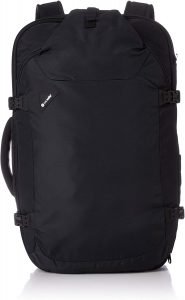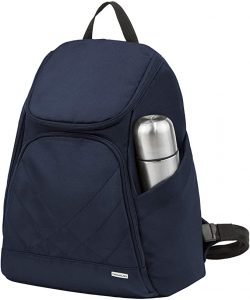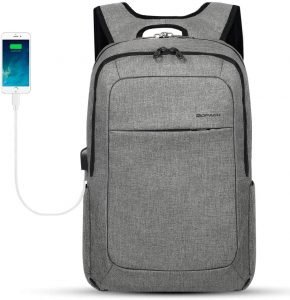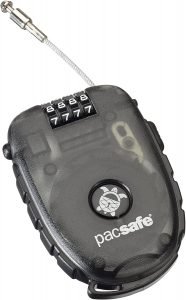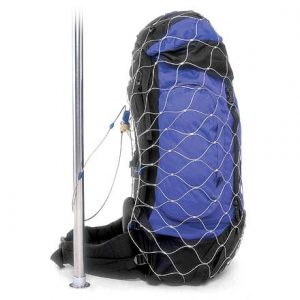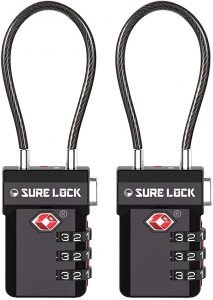A Background On Backpacking Security
If you have ever investigated the possibility of backpacking across the country, through a new continent, or around the world, you have probably spent some time considering the various pros and cons. While a backpacking trip can be an extremely rewarding experience, it can also be risky to travel with all of your belongings on your back when you aren’t experienced in proper backpacking security. Many novice and experienced backpackers alike find themselves spending their time in transit wide awake, worried that a moment of lapsed vigilance will mean the theft of all their worldly possessions.
These fears are not unfounded and exist because of the very real risks associated with backpacking. Backpacking can leave you feeling vulnerable, especially since the theft of your one bag could leave you with nothing. That said, there are millions of travelers that have successfully backpacked regions around the world, proving that it is absolutely worth the possible risks. With appropriate preparation and a healthy dose of vigilance, you can backpack without the fear of losing your belongings.
Here, we’re sharing a few tips for general safety while backpacking, offering several strategies for securing your pack on the road, and sharing some of our absolute favorite backpacking security gear. If you’ve dreamt of putting your life in a backpack and traveling the world, live those dreams, just be sure to live them safely!
Backpacking Safety Tips | How To Secure Your Backpack | Best Backpacking Security Gear
Tips for Safe Backpacking
Travel of any kind can be risky, and backpacking is no exception. Backpacking can take you entirely out of your comfort zone, plunging you into new experiences and scenarios you may never have had to navigate before. You will rely on local transportation, services, and people, learn to become more self-sufficient, and discover just how little you can truly live with. Among the many incredible experiences you are likely to have, you may also find yourself in risky, dangerous, or confusing situations, which is precisely why you prepare for your adventures ahead of time.
Dress Modestly
No, we don’t mean you can’t break out your favorite tank top or pair of booty shorts while backpacking, but when traveling in a new country, it isn’t always a good idea to make yourself stand out. Dressing modestly and in accordance with the local trends will help to prevent you from standing out, and will keep you from looking like a vulnerable tourist ripe for the pocket-picking. Dressing modestly can mean wearing regular clothes and streetwear, carrying inexpensive and worn gear, and keeping your valuables hidden when in public.
If you plan to carry a camera with you, and want to keep eyes off your expensive piece of equipment, consider carrying it in a plastic shopping bag or an inexpensive tote while on the go. Pop the camera out when you need it, then return it to its bag when you’re done to keep attention off of you. To sum this point up: don’t be flashy, and do your best to blend in!
Carry Small Amounts of Cash
Some tourists feel the need to exchange all their cash for the local currency the moment they set foot in a new country, but carrying wads of paper money with you through a new city or town isn’t necessarily the best idea. When you arrive at your destination, take out only a small amount of cash, and keep the rest stashed in your bank account. With your credit or debit card hidden deep in your backpack, and just a few bills in your pocket, you won’t risk losing as much should a pickpocket manage to get to your stash.
Forget Back Pockets
If you insist on carrying items in your pockets while traveling, it’s time to completely forget about your back pockets. Carrying items like your phone, cash, wallet, camera, ID, or other valuables in your back pocket is like inviting thieves to pickpocket you. Leaving items in your back pocket makes them vulnerable, especially if you are in highly populated or crowded areas. Stick to your front pockets, inner breast pockets, and jacket pockets where you can easily monitor them, or better yet, keep items in your backpack until you need them to make sure they are extra safe.
Pack Light
The less you have with you, the less there will be for people to steal, and you’ll be able to keep closer track of your items. Backpacking involves a lot of carrying of luggage and moving from one location to another, so avoiding bringing too much is as much for comfort and ease as it is for security. Beyond being easier to handle and carry, lighter packs are also easier to protect and organize, since you will be able to give everything a place.
If possible try consolidating your items by packing pieces that serve multiple purposes. If you plan to take lots of photos, and also want to have your phone, try bringing just a smartphone rather than a smartphone and a camera to lighten your load. This also means carrying fewer valuables, meaning you’ll lose less in case of a theft. Basically: Leave your most expensive items and anything unnecessary at home.
Make Copies of Important Documents
If you do suffer a theft or a loss, having copies of your important documents on hand will come in extremely handy. It is quite the process to recover a backpack full of missing valuables, but having copies of important items like IDs, travel documents, and more can help to speed up the process and keep you safe in the meantime.
Consolidate Your Items
If you have a fancy camera or computer and intend to bring it with you on your travels, we suggest not bringing a dedicated camera or computer bag. Keeping your valuable electronics in your main bag will help to keep you from making yourself a target since few things are as tempting to steal as a lone camera bag. Keep everything in your large backpack, and take out individual items only in safe, uncrowded spaces.
Travel with a Friend
It is impossible to watch your own back at all times, which is why it is a good idea to travel with a friend. Having a second pair of eyes to keep a lookout for suspicious behavior or possible thieves is invaluable on the road, and can help to give you a more relaxing experience. Having a friend to keep an eye on your things and vice versa will help you to avoid losing items and will help to deter potential thieves. Remember: safety in numbers.
How to Secure Your Backpack
There are several risks associated with backpacking, but perhaps the most well known is the threat of theft. With everything that matters crammed in one bag, the theft of that single item could destroy your vacation and could cost you tons of money and time. Backpacks can be snatched and stolen altogether, rummaged and picked through for valuable items, and slashed by opportunistic pickpockets looking to score cash. Though there certainly aren’t pickpockets waiting around every corner to rob you the moment you leave home, it is always important to be vigilant and careful when traveling to avoid trouble.
Because your backpack is your most important piece of gear, learning how to secure it is extremely helpful for increasing your backpacking security. Your backpack may need to be secured for a wide range of reasons, whether you want to take a nap while in transit, need to leave your bag for a moment, or simply want to keep eyes off your belongings. Luckily, there are lots of ways to secure your backpack and valuables, even if you aren’t actively watching them.
Anti-Theft Backpacks
True to their name, anti-theft backpacks are specifically designed to deter thieves and to make it far more difficult for determined thieves to get to your valuables. Made to appear like normal, everyday backpacks, anti-theft backpacks are packed with special features to make your items more secure. Some common features of anti-theft backpacks include:
- RFID Shields: Back in the day, travelers were able to thwart pickpockets by carrying cards rather than cash, but as consumer technology grows, theft tech grows along with it. RFID readers can capture information from cards through the fabric/material of regular backpacks, stealing your information and money without ever touching your belongings. Anti-theft backpacks often feature RFID shields to protect sensitive information from data-theft, giving you additional physical protection from virtual threats.
- Secret Pockets: One of the easiest ways to keep someone from taking your things is to make it difficult to find them. High-quality anti-theft backpacks include secret, hidden pockets where you can stash your belongings out of sight. Typically made small and discrete within the deepest areas of the backpacks, these pockets are perfect for passports and IDs, cash, credit cards, and cellphones.
- Slash-Proof Fabric: While locking the zippers of your regular backpack can help to deter petty thieves, a determined thief won’t be stopped because they can’t get the bag open easily. Thieves use knives, razor blades, and other sharp objects to slash the fabric of backpacks to access the insides without the hassle of breaking into a lock. Anti-theft backpacks are made with reinforced fabrics that can’t be cut by regular tools, ensuring no one will be slashing holes in your backpack to get to your stuff.
- High-Security Zippers: Again, zipper locks might slow thieves down, but they won’t make your zippers entirely tamper-proof. Conventional zippers can easily be pried apart and opened, which can leave your belongings vulnerable to theft. High-security zippers are made to be extra durable and nearly impossible to pry apart, so your backpack will only be unzipped when you want it to be.
Bag Locks
Whether you have a regular backpack, or an anti-theft backpack, investing in a set of high-quality bag locks is always a good idea. Locks can be used to safely secure your backpack to stationery items like benches, radiators, and other permanent fixtures, making sure a thief won’t be able to snatch up your pack and make a run for it.
When taking a nap, quickly locking your bag to your seat can help you sleep more soundly. If you need to run to the bathroom or go into a store and don’t want to carry a clunky backpack, locking it to a bench or a signpost can allow you to safely browse without worrying about rushing back to your belongings. Bag locks are super versatile, come in many shapes, sizes, and varieties, and are a relatively inexpensive method of securing your backpack on the road. Double-sided cable locks are a particular favorite of many backpackers, and you’ll find our suggested versions later in this article!
Security Covers
Security covers are essentially tamper-proof bags or nets that can be placed over your bag and secured to a stationary item for additional security. Security covers are typically made from the same slash-proof materials as anti-theft backpacks or metal mesh, surrounding your backpack in a protective shield. Most security covers are also outfitted with a cable and locking feature, which allows you to firmly and securely lock the bag to prevent thieves from running off with them both.
Zipper Locks
Most backpacks feature several large, medium, and small pockets, each of which is typically secured with a zipper. Though you may not be able to secure every zipper on your pack, adding locks to the largest and most obvious zippers may be enough to deter pickpockets and thieves from giving you a second glance.
Zipper locks slow down anyone trying to get into your bag (you included) but are perhaps more helpful for giving pickpockets the illusion that you have nothing to steal. Sometimes, the presence of a simple backpack security system like zipper locks will make thieves assume that the rest of your pack is secured as well, and they’ll pass on to easier, less prepared prey.
Keep Your Bag On Your Person
If you want to make sure nothing happens to your backpack while you are on the road, keep it on your person at all times. Use cables and locks to lock your bag to your clothing while you sleep on the train, wear your backpack to museums and tourist destinations, and never leave your pack unattended. Some backpackers even prefer not to leave their bags in their hotel rooms, no matter how trustworthy they may be. If you’ve packed light enough, this should be no problem, so be sure to be minimalistic during your preparations if you plan to keep your bag on you all the time.
Best Backpacking Security Gear
Let’s talk gear! As much as vigilance and being thoughtful can help you to avoid running into trouble, there’s no reason not to stack the deck in your favor. There is a ton of gear available, made specifically for backpacking security and individuals who love to travel. There’s something for everyone, and the option you settle on will probably be the result of a little bit of trial and error.
To get you started, check out these amazing pieces of backpacking security gear:
Anti-Theft Backpacks
Venturesafe EXP45 Anti-Theft Carry-On Travel Pack from Pacsafe
Pacsafe is perhaps the most well-known brands offering anti-theft backpacks and has become a popular choice for backpackers everywhere. The Venturesafe EXP45 model comes equipped with all of Pacsafe’s signature safety features like anti-slash eXomesh, puncture-resistant zippers, build in locking mechanisms, secret pockets, and stainless steel anchor cables to firmly attach your bag to stationary objects.
View The Venturesafe EXP45 On Amazon | View Other Anti-Theft Backpacks
Anti-Theft Classic Backpack from Travelon
Travelon bags are made for optimum security and style, designed with premium fabrics and special anti-theft features that make these bags as safe to use as they are fashionable. The Anti-Theft Classic is made with durable slash-proof mesh, special locking compartments, and a protective RFID shield to protect your information from hackers and scammers.
View Travelon’s Pack On Amazon | View Other Anti-Theft Backpacks
Anti-Theft Computer Bag from KOPACK
Designed specifically for people traveling for work, this anti-theft backpack from KOPACK features everything you need to keep your business safe on the road. Complete with a hidden locking laptop pocket, a detachable USB cable for easy charging, and anti-puncture zippers, this option will help keep you feeling productive and secure while backpacking.
View KOPACK’s Bag On Amazon | View Other Anti-Theft Backpacks
Backpack Locks
Retractasafe 250 Cable Lock from Pacsafe
Made by Pacsafe and designed to be tamper-resistant, this simple four-dial combination lock features an extendable and retractable cable. Make the cable longer or shorter depending on need, and use the lock to attach your backpack to stationary objects, other belongings, or your chair while you take a nap. The Retractasafe 250 Cable Lock includes 35 inches of durable cable and is super quick and easy to use, even if you need to attach your bag to a large object.
View The Retractasafe 250 On Amazon | View On REI | View Backpack Locks On Amazon
Triple Security Lock from Lewis N Clark
A favorite affordable option of backpackers everywhere, the Triple Security Lock is a double cable combination lock featuring plastic coated steel cables that can easily attach to your bag and anything else. Use this lock to keep zippers closed, to secure your bag to a stationary object, and much more.
View The Triple Security Lock On Amazon | View Backpack Locks On Amazon
Security Covers
Security Web from Pacsafe
Made from lightweight, flexible, slash-proof stainless steel, the Security Web from Pacsafe fits perfectly over standard backpacking packs, protecting them from theft and possible damage. The steel of the mesh is made to withstand even the most targeted attacks against the bag, and the entire mechanism locks to prevent removal of the security cover. When you’re not using it, the Security Web folds up into a small, super compact bag, and can easily be slipped into a pocket and forgotten about until it is needed again.
View On REI | View On Amazon | View Other Security Covers
UltraLight Pack Raincover from Osprey
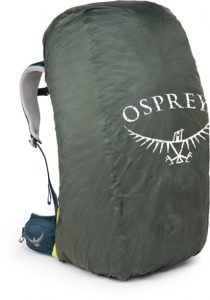
Osprey UltraLight Pack Raincover
Though not specifically designed for durability against possible theft, adding something like a waterproof cover to your backpack can help make you stand out less amongst the locals. This UltraLight Pack Raincover from Osprey will keep your pack dry while also disguising it, making it impossible for thieves to get a good look at what you are carrying, With no way to know where to slash, thieves are more likely to leave you be if you protect your bag from view.
View On REI | View On Amazon | View Other Raincovers
Zipper Locks
SureLock
Scaled-down cable locks like these from SureLock are the perfect thing to quickly secure the zippers and pockets of your backpack. Lock zipper pulls together, or attach the pulls to other parts of your bag to prevent anyone from getting inside. Even if someone were to bring a wire cutter with them, these locks would help slow them down, hopefully long enough for them to be detected. These particular zipper locks feature a three-dial combination, making them more secure than conventional locks which can be picked by savvy thieves.
View SureLock’s Zipper Lock | View Other Zipper Locks
Max DesMarais is the founder of hikingandfishing.com. He has a passion for the outdoors and making outdoor education and adventure more accessible. Max is a published author for various outdoor adventure, travel, and marketing websites. He is an experienced hiker, backpacker, fly fisherman, trail runner, and spends his free time in the outdoors. These adventures allow him to test gear, learn new skills, and experience new places so that he can educate others. Max grew up hiking all around New Hampshire and New England. He became obsessed with the New Hampshire mountains, and the NH 48, where he guided hikes and trail runs in the White Mountains. Since moving out west, Max has continued his frequent adventures in the mountains, always testing gear, learning skills, gaining experience, and building his endurance for outdoor sports. You can read more about his experience here: hikingandfishing/about

